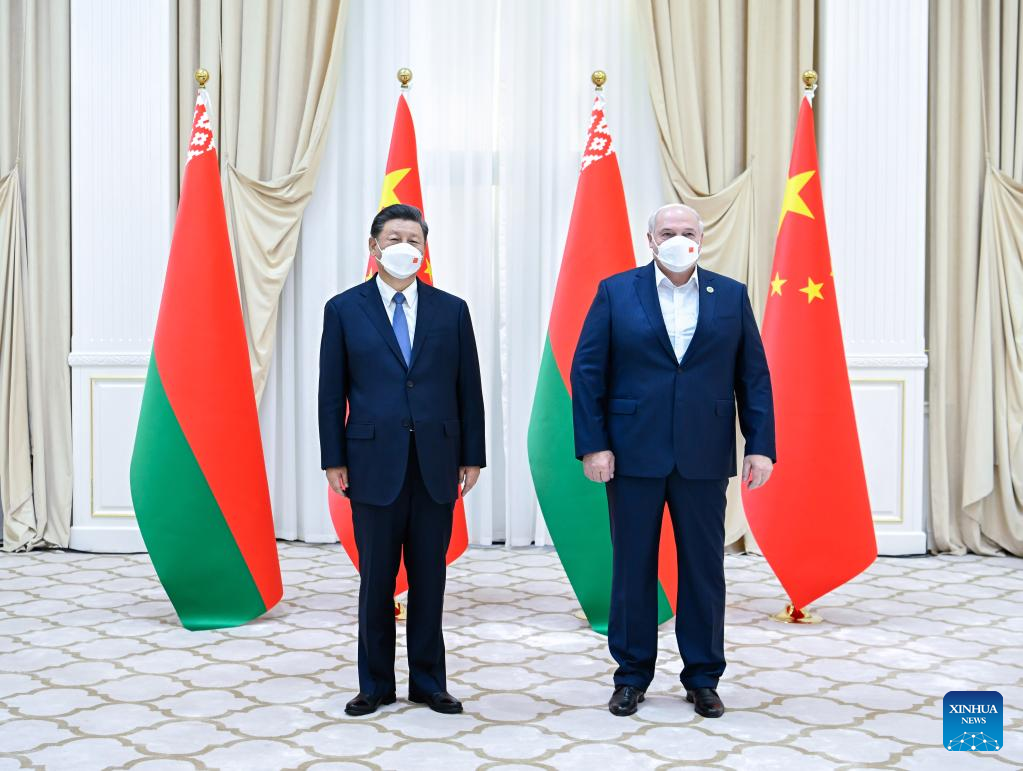
Chinese President Xi Jinping meets with Belarusian President Alexander Lukashenko at Forumlar Majmuasi Complex in Samarkand, Uzbekistan, Sep 15, 2022.
China and Belarus on Thursday agreed to upgrade bilateral relations to all-weather comprehensive strategic partnership, following a meeting between Chinese President Xi Jinping and Belarusian President Alexander Lukashenko on the sidelines of the 22nd meeting of the Council of Heads of State of the Shanghai Cooperation Organization (SCO) in Samarkand, Uzbekistan.
Belarus becomes China's second all-weather strategic partner, following Pakistan which has been an all-weather strategic cooperation partner of China since 2015.
The 22nd meeting of the Council of Heads of State of the SCO on Friday began the process to admit Belarus to the SCO as a member. As an SCO observer state, Belarus had previously submitted an official application to become a full member.
Chinese analysts said that the upgrade of China-Belarus relations follows 30 years of deepened bilateral cooperation in various fields including economic, trade and political engagement, and deepened mutual trust, and that the historical leap in bilateral relations set up a strong example for state-to-state relations amid unilateral sanctions and bloc confrontation stirred up by the US and also injected stability to Central Asia and East Europe that are coping with challenges of an economic downturn and the threat of a "color revolution."
The two countries issued a joint statement which said the two sides respect and support development paths and domestic and foreign policies chosen by each other, and firmly support each other on issues concerning their respective core interests including sovereignty, independence and territorial integrity.
Reiterating its adherence to the one-China principle, Belarus recognizes that the government of the People's Republic of China is the sole legal government representing the whole of China and that Taiwan is an inalienable part of China's territory, opposes any form of "Taiwan independence," and supports all efforts made by the Chinese government for national reunification.
China speaks highly of Belarus' development achievement, supports Belarus' efforts to ensure political and social stability and economic development and opposed external forces interfering in the internal affairs of Belarus for any reason, according to the statement.
The two sides will deepen the high-quality Belt and Road Initiative (BRI), and continue to advance the implementation of the Agreement on Economic and Trade Cooperation between the People's Republic of China and the Eurasian Economic Union.
Zhao Huirong, an Eastern European studies expert from the Chinese Academy of Social Sciences, told the Global Times that Belarus was called an all-weather strategic partner after Pakistan, reflecting how China-Belarus relations have maintained a high-level mutual trust and cooperation over several decades.
She said that the significance of all-weather strategic partnership also lies in that countries of different sizes can maintain equal and cooperative relations and achieve common development, and that China-Belarus relations set a remarkable example for international relations and serve as a model for a new type of state-to-state engagement.
Belarus has actively participated in the BRI with the China-Belarus Industrial Park being a major successful and pragmatic project, and both countries supported each other's core political interests and shared similar views on regional and international issues, Yang Jin, an associate research fellow at the Institute of Russian, Eastern European and Central Asian Studies at the Chinese Academy of Social Sciences, told the Global Times.
The joint statement sets out a clear plan for bilateral cooperation across various fields, puts forward guidelines and direction of future cooperation which could help upgrade bilateral practical cooperation and bring more benefits to the two peoples, Zhao said.
Yang stressed that the historical leap in China-Belarus relations does not just serve the development of the two countries, but also serves to the regional stability and prosperity, as Central Asia and East Europe have been plagued by economic plight caused by COVID-19 and the West's unilateral sanctions as well as threat of interference of the external forces.
Belarus was engulfed in mass protests after President Alexander Lukashenko won a sixth term in August 2020, with the opposition refusing to recognize the results. Chinese Foreign Ministry has expressed its firm stance in respecting the development path chosen by the Belarusian people in accordance with their national conditions and opposing outside forces creating divisions and instability in the country.
The statement said that the two sides will carry out production capacity cooperation and promote the establishment of joint ventures in machinery manufacturing, automobile and electric vehicle assembly, agricultural production, energy and biotechnology in the two countries.
They also agreed that ensuring food security is one of the key areas of bilateral cooperation. Henceforth, they will work to promote the production and processing of agricultural products and enhance the supply capacity of high-quality food.
The two sides will make joint efforts to build the China-Belarus Industrial Park into an international cooperation project and a satellite city of Minsk. Both sides believe that attracting investment and promoting traditional Chinese medicine (TCM) will further promote the development of the industrial park.
Both sides will further expand practical cooperation in various fields between the two militaries, including exchanging high-level and expert delegations and holding joint military training, the statement said.
China and Belarus expressed grave concern over the increasingly complex international and regional security situation and vowed to pay close attention to challenges that threaten strategic stability, undermine the arms control system and stir up an arms race.
The two sides oppose politicizing and applying double standards on the human rights issue, and oppose interference in other countries' internal affairs in the name of human rights, the statement said.




